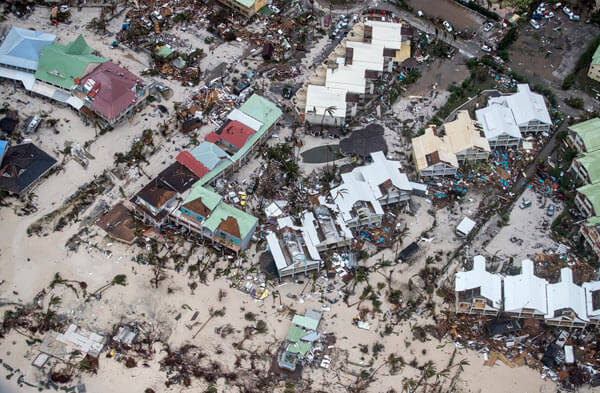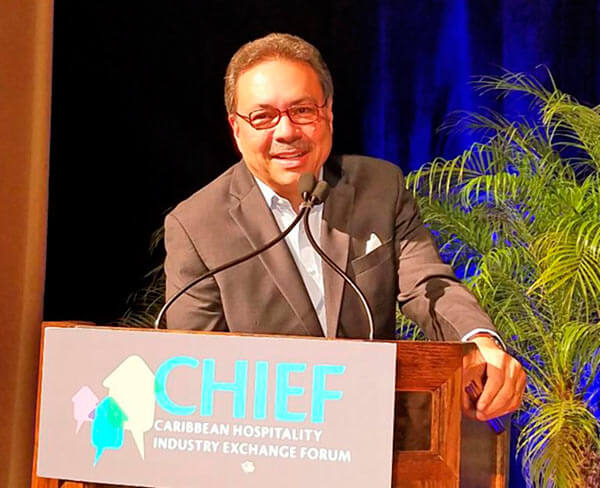The Caribbean Hotel and Tourism Association (CHTA) presented a paper to attendees at a Capitol Hill Briefing in Washington D.C., urging the creation of a Caribbean-United States public-private sector dialogue and a framework for a Caribbean-United States tourism action agenda to strengthen Caribbean engagement with the United States.
Maintaining that tourism presents the Caribbean with the quickest way to create jobs, reduce public debt and stimulate new business activity, CHTA’s Chief Executive Officer and Director General Frank Comito said that “a new demand-driven public-private sector approach and resolve by the region’s leadership, the United States and other major global tourism trading partners is necessary for the countries throughout the region to maximize the benefits from tourism and for the United States to further benefit from a more secure, stable and prosperous Caribbean.”
Organized by the Washington-D.C.-based Caribbean-Central American Action and the Inter-American Development Bank, attendees included representatives from the United States Congress and US Administration, private sector leaders, the diplomatic community and representatives from Washington’s multilateral institutions.
Joining Comito at the briefing was CHTA President Karolin Troubetzkoy and Vincent Vanderpool-Wallace, a member of the CHTA Board of Directors and chair of the organization’s Government Relations Committee.
Comito called on stakeholders to explore opportunities and challenges for the United States and the Caribbean region through tourism.
He participated in a panel session with moderator former Jamaica Ambassador Richard Bernal, incoming pro-vice chancellor of Global Affairs at the University of the West Indies and representatives from the financial services and energy sectors.
Two days prior to the briefing, the U.S. House of Representatives had just passed legislation to strengthen United States engagement with Caribbean countries.
The United States-Caribbean Strategic Engagement Act (H.R. 4939), which Rep. Eliot L. Engel (D-NY), Ranking Member of the House Committee on Foreign Affairs, introduced with Rep. Ileana Ros-Lehtinen (R-FL), would require the Secretary of State and the Administrator of the US Agency for International Development (USAID) to submit to Congress a multiyear strategy focused on enhancing engagement with the countries of the Caribbean and outreaching to diaspora communities in the United States, Government, private sector and civil society interests.
The legislation puts particular emphasis on energy security, countering violence, expanded diplomacy, and other priority areas, CHTA said.
“The bill is an important first step to see a further expansion on the collaboration between the United States and the Caribbean region and we hope that the appropriate funding will be made available to address the various requirements highlighted in the bill,” Troubetzkoy said.
“We are all aware of the complex and diverse issues that affect many of our Caribbean nations and the strides that need to be made to jump-start our economies and create jobs, but also in the areas of climate resilience, energy efficiency, education and safety and security,” he added. “Tourism is recognized as holding the greatest potential as the region’s economic driver. Therefore, a strengthening of our collaborative efforts with the United States can only be beneficial to achieve our region’s overall goals”
Comito said tourism ties between the United States and the Caribbean “extend well beyond the 14.3 million Americans who travelled as overnight visitors in 2015, spending over US$15 billion in the Caribbean.
“This represented 50 percent of our record setting 28 million overnight visitors in 2015 and does not include those visiting our shores on cruise ships, mostly from U.S. destinations,” he said. “Our ties extend to the cultural, historic and economic relationships which have underscored our connectivity and inter-dependence for centuries.
“While the U.S. accounts for our region’s most significant exports — the Caribbean is one of the United States most important strategic partners — in trade and in talent. CHTA is a federation of 32 hotel and tourism associations throughout the region and we have over 1,000 member companies, which include some of America’s most noted global travel and tourism industry brands — including Hilton, Marriott, the Hyatt, Expedia, JetBlue and American Airlines,” he added.
CHTA proposed a number of agenda items, which it said, should be part of a regional and U.S. public-private sector dialogue around stimulating tourism.
These focused on a review of policies to stimulate travel to and within the region, including looking at ways to reduce air travel costs; improve the arrivals and departures processing experience, advance “one-stop” security clearance for travel within the region; extending U.S. Preclearance; waiving U.S. visa requirements for intra-Caribbean travel thru Puerto Rico or the U.S.; and a range of other travel-related recommendations.
The organization sees potential through greater collaboration around health and safety standards, and recently emerged issues such as the taxation and regulation of the sharing economy, while also building upon work already underway to promote greater energy efficiencies within the tourism sector.

























